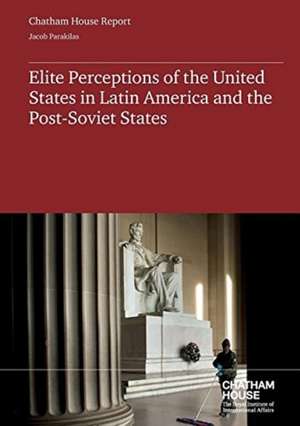Elite Perceptions of the United States in Latin America and the Former Soviet Union
Autor Jacob Parakilasen Limba Engleză Paperback – 20 sep 2016
The policy messages the United States intends to send are often not the messages received by other countries. The misunderstandings that arise can have significant impacts on bilateral relations and on the efficacy of America’s policies. Understanding why there is such dissonance and the context in which different countries and regions perceive the United States is a first step to designing better policies. This report highlights the views individuals in elite roles in public, private, non-profit, academic, and media sectors from twelve countries across Latin America and the former Soviet Union have of the United States—its national character, its foreign and domestic policies, its cultural outputs, and its overall role in the world.
Preț: 111.51 lei
Nou
Puncte Express: 167
Preț estimativ în valută:
21.34€ • 23.19$ • 17.94£
21.34€ • 23.19$ • 17.94£
Carte indisponibilă temporar
Doresc să fiu notificat când acest titlu va fi disponibil:
Se trimite...
Preluare comenzi: 021 569.72.76
Specificații
ISBN-13: 9781784130961
ISBN-10: 1784130966
Pagini: 24
Dimensiuni: 298 x 210 mm
Greutate: 0.15 kg
Editura: Brookings Institution Press
Colecția Chatham House
ISBN-10: 1784130966
Pagini: 24
Dimensiuni: 298 x 210 mm
Greutate: 0.15 kg
Editura: Brookings Institution Press
Colecția Chatham House
Notă biografică
Jacob Parakilas is assistant project director for the US Project at Chatham House. Before joining Chatham House, he worked for Action on Armed Violence, a London-based non-governmental organization. His research has largely focused on American foreign policy and international security issues. Originally from Lewiston, Maine, Jacob holds a BA in International Relations from Hampshire College, an MLitt in Middle East and Central Asian Security Studies from the University of St Andrews, and a PhD in International Relations from the London School of Economics. He has also worked at the World Security Institute, the Arms Control Association and the US Department of Homeland Security.
